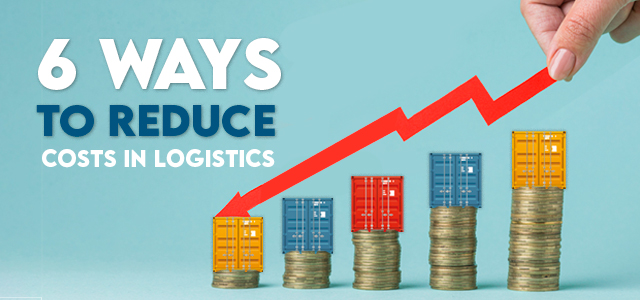Blog
All Articles
Total posts: 11

May 12, 2023
6 Ways to Reduce Costs in Logistics
Transportation is an essential component of the supply chain, and every industry participant strives to receive the most modern transport services at reduced prices. Transport logistics costs are skyrocketing these days for a variety of reasons. Inadequate planning, lack of transparency, and poor decision-making can lead to higher prices, missed deliveries, unhappy customers, and loss of business.
Listed below are 6 proper ways to decrease your logistics costs.
1. Consolidation of supplies
The company's delivery rates are determined depending on weight, distance, and other factors. Consolidation of shipments is one of the strategies suppliers use to make fewer trips and profit from lower rates on bulk orders.
2. Decentralized warehouse services
Another way to reduce transport costs is to use multiple decentralized warehouses. Having goods in decentralized warehouses ensures that they are already in proximity to the customer, allowing greater flexibility and shorter delivery times. Professional inventory management and communication are essential to plan optimal transport routes and save costs by knowing exactly how much and what types of goods are in stock.
3. Automatic container loading system
When handling bulky and heavy goods, loading and unloading containers is a critical part of the workflow. Using an automatic container loading system is a great way to reduce transport and labor costs, avoid product damage, and increase productivity by being able to load or unload all goods at once.
4. Use of technology
The COVID-19 pandemic has shown unequivocally that documenting processes on paper is no longer relevant. There are enterprises for which the digitalization of processes may seem like a significant change in material terms. However, in this case, the benefits outweigh the costs. Digital records give logistics managers a better understanding of the entire supply chain. Computerized record-keeping allows companies to find and correct shortcomings that are costing them money.
5. Reduce the size of your vehicle fleet
Finding effective solutions for fleet cost management can be quite a challenge. It is possible to cover more territory in less time by effectively distributing orders between available vehicles. When fewer trips are required to accommodate more deliveries, it is possible to decommission vehicle assets, further reducing costs.
6. Regular vehicle maintenance
Preventive maintenance can help you avoid breakdowns and keep your vehicle in top condition. With the right regular vehicle maintenance program, you can keep track of how far you've driven, how many times you've stopped, and how much fuel you've used. Good service helps keep vehicles running, resulting in lower fuel consumption and energy wastage, reducing transport costs.

April 28, 2023
Door-to-Door Service: Efficient and Reliable Way to Transport Your Cargo
The development of infrastructure and logistics requires companies to improve the solutions offered to customers constantly. First, the principles of ensuring efficiency and safety are taken as a basis. Door-to-door service is ideal for these purposes. The essence of the service is that the carrier company assumes all responsibility for the preparation, shipment, and transportation of the cargo, which allows you to save time and control each stage of the process.
Advantages of door-to-door service
1. At all stages of transportation - from the moment the cargo is received to its delivery to the destination, it saves the time and effort of the customer, who entrusts the control to the carrier. It also saves the customer from unnecessary formalities.
2. Maximum protection of cargo against the risk of damage is ensured.
3. After loading, the goods are sent to any part of the world without intermediate storage and handling.
4. It is recommended when sending bulk cargo.
Disadvantages of door-to-door service
1. Sometimes, depending on the type of cargo, the use of this service is not possible. Door-to-door delivery is not applicable, for example, to liquid and bulk cargo in large volumes, and dangerous goods (additional verification is required).
2. Higher cost compared to other modes of transportation.
3. Without stable sales, this scheme is unprofitable for the client.
Service Features
The carrier company prepares all the necessary accompanying documents within the door-to-door service, carries out direct transportation, forwarding, customs clearance, and unloading operations upon arrival at the destination, and assumes all duties and responsibilities related to cargo delivery. During cargo transportation, the company provides a comprehensive approach, involving several types of transport, as well as intermediaries with whom it negotiates directly.
Cost Calculation
To determine the final cost of door-to-door service, it is important to consider several important points:
- cargo volume/weight;
- the length of the transportation distance;
- time required for delivery;
- transport costs;
- cargo insurance.

April 12, 2023
Surviving Natural Disasters: Mitigating Supply Chain Risks
Thanks to globalization and the rapid geographic expansion of international supply chains, companies can allocate limited resources more efficiently than ever before. But, unfortunately, this process also has its downside - the unpredictability of weather conditions, on which many logistical processes partially depend. Today we are talking about natural disasters.
Natural disasters affect the transportation of goods in many ways, from delaying your supply chain and increasing costs to unpleasant situations such as lost cargo and damaged goods.
A supply chain disruption is defined as a critical failure in the overall logistics process. Natural disasters are one of the causes of such violations. They usually cause massive damage to several firms and facilities at once, which has a serious impact on the industry. With the globalization of supply chains, companies' exposure to disaster risk has crossed national borders, as the effects of a natural disaster in one geographic location can affect facilities in other locations.
But shippers have an opportunity to mitigate risks during natural disasters. First, you need to communicate frequently to keep your employees and products up to date. Effectively communicating changes to plans is a significant time and money saver, but this is only possible if your supply chain provides full transparency at every stage of the shipping process.
Tariffs
Obviously, your shipping rates will increase during a natural disaster. For example, if the roads are impassable, it will be necessary to use alternative routes, increasing fuel consumption and driving time.
Productivity
After a disaster, there is intense competition for limited transportation resources and equipment. Due to those limitations, the productivity of the company decreases and this will naturally lead to increased costs due to shortages at best. In the worst-case scenario, it will be impossible to find the necessary resources.
Shipping time
If under normal circumstances the transportation period would take two days, this period may be extended due to the uncontrollable effects of natural disasters. It may have to wait until the roads are open or until the warehouse/factory resumes operations. As a result, your travel time will increase.
Fuel
Fuel prices always rise after natural disasters. Oil refinery shutdowns, damage, or disruptions cause fuel prices to rise.
Refusal to carry
During a natural disaster, carriers often refuse to deliver goods to their destination. This is where the supply chain begins to break down: factories are disrupted while waiting for materials or components; retailers face the threat of stockouts, etc. All this leads to the loss of potential opportunities and income.
Internal delays
Often, cargo transportation within the country also depends on weather conditions. Even if there is zero risk of a natural disaster in your region, delivery of goods will be delayed due to facility closures or power outages due to inclement weather. And, of course, as a result, it will have a negative impact on logistics.
Of course, when the customer chooses a logistics company for the transportation of his cargo, he is concerned about the safety and integrity of the delivery, because various unexpected situations may arise during the transportation process. What do we do to transport your cargo safely? First of all, the general technical condition of the transport is strictly monitored, and all rules and standards ensuring the safety of cargo transportation are followed, especially during loading and unloading operations. Alliance Logistics specialists work out the optimal route, considering the time of year, weather conditions, and travel time.

March 28, 2023
Key Logistics Trends in 2023
In recent years, the coronavirus pandemic has affected all sectors of the global economy. Logistics companies have to change their strategies to be more innovative to reduce losses and meet the new demands of the economy in the face of restrictions. There is an urgent need to respond in a timely manner to the rapidly changing trends in logistics in 2023.
The main ones include the following:
Digitalization and artificial intelligence
The pandemic contributed to a shift in the vector of business development, which also affected the digitalization process. Companies now face the challenge of integrating human capabilities and artificial intelligence. Investments in the development of information technology are considered one of the best ways to reduce the costs of companies. Severe quarantine restrictions have underlined the clear need for such innovations. Logistics companies are increasingly introducing new systems for managing warehouse and transport operations, new IT solutions to optimize logistics solutions, and also improve existing ones.
Elastic logistics
The market is governed by the law of supply and demand, the ratio of which is sometimes unpredictable. In this aspect, thanks to elastic logistics, it is possible to increase and decrease capacities in the supply chain, and quickly adapt to changing realities. The "flexibility" of logistics helps to reduce costs and not lose potential profits.
Focus on online commerce
The global Covid-19 pandemic has significantly affected the market structure and growth of online shopping and helped remove barriers to taking advantage of e-commerce. Electronic alternatives to offline offerings have been launched to meet dynamic consumer demands. The conservatism of some companies in this matter has led to forced closures or significant losses.
Green logistics
Global warming and human impact on the environment are no longer considered abstract concepts, but the specific problem, which is being addressed in all spheres of life. The logistics industry is also no exception. Green Logistics - a new concept in this area, aimed at reducing the industry's impact on the environment. There are many ways to prevent pollution by green logistics companies - optimizing loading, optimizing the route, choosing a more environmentally friendly mode of transportation, etc. In the future, this trend is only expected to further strengthen.
Last Mile in logistics
This is the last stage in the delivery of goods to the buyer. At this stage of the supply chain, there are some difficulties, the main of which is the speed of delivery. In order to compensate for delays in global transportation, courier services are trying to make the most of the efficiency on the last mile. Only in this case, they will be able to manage the situation, meet the requirements of the market and strengthen their position in the business.














